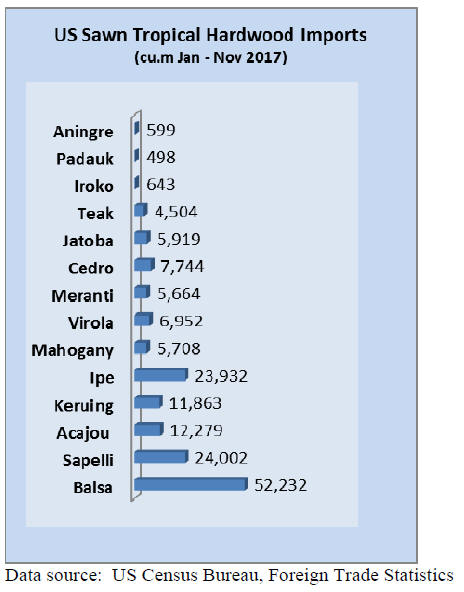|
Report from
North America
Decline in balsa imports
US imports of temperate and tropical sawn hardwood
declined 8% in November to 65,272 cu.m. The value of
sawn hardwood imports declined 9% from the previous
month to US$38 million.
Import volumes of tropical species fell 19% in November
to 17,936 cu.m., while the value of imports was down 9%
from October.

The significant decline in volumes in November was
mainly due to lower balsa and sapelli imports. Balsa
imports from Ecuador fell 38% to 3,292 cu.m. Imports of
sapelli sawnwood were only1,862 cu.m. in November,
down 54% from the previous month. Year-to-date imports
of sapelli remain higher, however, than at the same time
last year.
Sawnwood imports from Brazil increased 30% in
November because of higher ipe imports. Ipe imports from
Brazil grew to 2,868 cu.m. However, the year-to-date
import volumes of ipe were down 7% in November
compared to the same time last year.
Keruing imports from Malaysia increased in November,
but the overall value of sawnwood imports from Malaysia
was down from October due to lower meranti shipments to
the US.
Steep decline in Canadian tropical sawnwood imports
in November
Canadian imports of tropical sawnwood fell 40% in
November to less than US$1 million (US dollars). Yearto-
date Canadian imports were 4% lower than in
November 2016.
Imports of most major species including sapelli declined
in November, but sapelli sawnwood imports from
Cameroon increased to US$154,995. Balsa imports from
Ecuador also grew in November after record low imports
in October.
Canada launches wide-ranging trade complaint against
US
Canada has filed a WTO complaint over US antidumping
and countervailing duty proceedings. In its complaint
Canada says the US procedures are against international
trade rules in six different aspects, including WTO¡¯s Anti-
Dumping Agreement, the Agreement on Subsidies and
Countervailing Measures, the General Agreement on
Tariffs and Trade and the Understanding on Rules and
Procedures Governing the Settlement of Disputes.
The US Department of Commerce under the Trump
administration launched more than eighty anti-dumping
and countervailing trade investigations in 2017, almost
50% more than in 2016.
Canada¡¯s complaint cites almost 200 examples dating back
to 1996, with many involving countries other than Canada,
including China, India and Brazil.
The US has 60 days to try to settle the complaint, or
Canada could ask the WTO to adjudicate. The process
could take years. The US has lost cases in the WTO before
over its punitive duties system.
The Canadian Foreign Minister said the legal action was
part of a broader litigation to defend forestry jobs in
Canada.
In November 2017 Canada filed a complaint with the
WTO regarding US antidumping and countervailing duties
on Canadian sawn softwood. The US imposed preliminary
countervailing duties on Canadian newsprint in January.
The filing comes shortly before the next round of
negotiations between the US, Canada and Mexico for the
North American Free Trade Agreement (NAFTA). The
complaint might help Canada protect itself if the US
withdraws from NAFTA. Canada¡¯s complaint is available
on the WTO website.
Court hearing on formaldehyde rule compliance
deadline postponed
Last October two environmental groups challenged the US
Environmental Protection Agency¡¯s (EPA) authority to
extend the compliance deadlines for the formaldehyde
emissions rule.
The extension gives manufacturers and importers an
additional year before having to comply with the
Formaldehyde Emission Standards for Composite Wood
Products. The original compliance deadline was December
12, 2017.
Several US industry associations have filed briefs with the
court in support of the deadline extension, including the
Composite Panel Association and the International Wood
Products Association who represent importers. The federal
district court hearing on the case has been postponed until
the end of January.
|